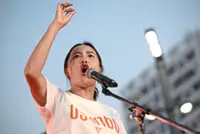A Thai voter casts his vote into the ballot box at the Taa Ta Kho village polling station as part of a re-run of general elections in Taa Ta Kho village in Petchaburi province, south of Bangkok on March 2, 2014. Polls opened peacefully in five Thai provinces for re-runs of a widely disrupted general election, authorities said, in the first move to complete a troubled vote that could provide a mandate for a new government. AFP PHOTO / Manjunath KIRAN
THE Constitutional Court has endorsed a Bill that amends the electoral system for Members of Parliament, effectively laying the framework for the general election that is due by May 2023.
The verdict not only gives the go-ahead for the changes to be implemented in the coming election, it also puts to rest months of fierce debate among lawmakers over the method that will be used to allocate party-list MP seats.





